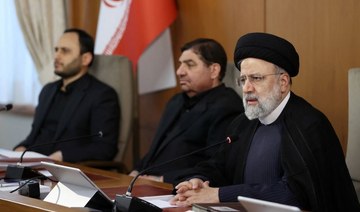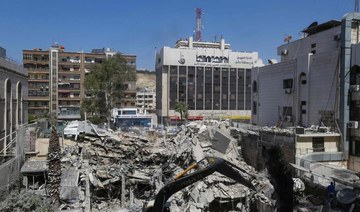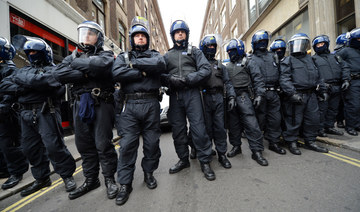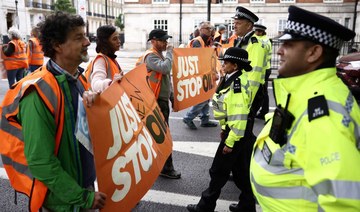WASHINGTON: Shortly after an airstrike widely attributed to Israel destroyed an Iranian consulate building in Syria, the United States had an urgent message for Iran: We had nothing to do with it.
But that may not be enough for the US to avoid retaliation targeting its forces in the region. A top US commander warned on Wednesday of danger to American troops.
And if Israeli Prime Minister Benjamin Netanyahu’s recent broadening of targeted strikes on adversaries around the region to include Iranian security operatives and leaders deepens regional hostilities, analysts say, it’s not clear the United States can avoid being pulled into deeper regional conflict as well.
The Biden administration insists it had no advance knowledge of the airstrike Monday. But the United States is closely tied to Israel’s military regardless. The US remains Israel’s indispensable ally and unstinting supplier of weapons, responsible for some 70 percent of Israeli weapon imports and an estimated 15 percent of Israel’s defense budget. That includes providing the kind of advanced aircraft and munitions that appear to have been employed in the attack.
Israel hasn’t acknowledged a role in the airstrike, but Pentagon spokeswoman Sabrina Singh said Tuesday that the US has assessed Israel was responsible.
Multiple arms of Iran’s government served notice that they would hold the United States accountable for the fiery attack. The strike, in the Syrian capital of Damascus, killed senior commanders of Iran’s Islamic Revolutionary Guard Corps for Syria and Lebanon, an officer of the powerful Iran-allied Hezbollah militia in Lebanon, and others.
American forces in Syria and Iraq already are frequent targets when Iran and its regional allies seek retaliation for strikes by Israelis, notes Charles Lister, the Syria program director for the Middle East Institute.
“What the Iranians have always done for years when they have felt most aggressively targeted by Israel is not to hit back at Israelis, but Americans,” seeing them as soft targets in the region, Lister said.
On Wednesday in Washington, the top US Air Force commander for the Middle East, Lt. Gen. Alexus Grynkewich, said Iran’s assertion that the US bears responsibility for Israeli actions could bring an end to a pause in militia attacks on US forces that has lasted since early February.
He said he sees no specific threat to US troops right now, but “I am concerned because of the Iranian rhetoric talking about the US, that there could be a risk to our forces.”
US officials have recorded more than 150 attacks by Iran-backed militias in Iraq and Syria on US forces at bases in those countries since war between Hamas and Israel began on Oct. 7.
One, in late January, killed three US service members and injured dozens more at a base in Jordan.
In retaliation, the US launched a massive air assault, hitting more than 85 targets at seven locations in Iraq and Syria, including command and control headquarters, drone and ammunition storage sites and other facilities connected to the militias or the IRGC’s Quds Force, the Guard’s expeditionary unit that handles Tehran’s relationship with and arming of regional militias. There have been no publicly reported attacks on US troops in the region since that response.
Grynkewich told reporters the US is watching and listening carefully to what Iran is saying and doing to evaluate how Tehran might respond.
Analysts and diplomats cite a range of ways Iran could retaliate.
Since Oct. 7, Iran and the regional militias allied to it in Syria, Iraq, Lebanon and Yemen have followed a strategy of calibrated attacks that stop short of triggering an all-out conflict that could subject Iran’s homeland forces or Hezbollah to full-blown war with Israel or the United States.
Beyond strikes on US troops, possibilities for Iranian retaliation could include a limited missile strike directly from Iranian soil to Israel, Lister said. That would reciprocate for Israel’s strike on what under international law was sovereign Iranian soil, at the Iranian diplomatic building in Damascus.
A concentrated attack on a US position abroad on the scale of the 1983 attack on the US Embassy in Beirut is possible, but seems unlikely given the scale of US retaliation that would draw, analysts say. Iran also could escalate an existing effort to kill Trump-era officials behind the United States’ 2020 drone killing of Iranian General Qassem Soleimani.
How far any other retaliation and potential escalation goes may depend on two things out of US control: Whether Iran wants to keep regional hostilities at their current level or escalate, and whether Israeli Prime Minister Netanyahu’s far-right government does.
Sina Toossi, a fellow at the Center for International Policy, said analysts in Iran are among those trying to read Netanyahu’s mind since the attack, struggling to choose between two competing narratives for Israel’s objective.
“One perceives Israel’s actions as a deliberate provocation of war that Iran should respond to with restraint,” Toossi wrote in the US-based think tank’s journal. “The other suggests that Israel is capitalizing on Iran’s typically restrained responses,” and that failing to respond in kind will only embolden Israel.
Ultimately, Iran’s sense that it is already winning its strategic goals as the Hamas-Israel war continues — elevating the Palestinian cause and costing Israel friends globally — may go the furthest in persuading Iranian leaders not to risk open warfare with Israel or US in whatever response they make to Monday’s airstrike, some analysts and diplomats say.
Shira Efron, a director of policy research at the US-based Israel Policy Forum, rejected suggestions that Netanyahu was actively trying with attacks like the one in Damascus to draw the US into a potentially decisive conflict alongside Israel against their common rivals, at least for now.
“First, the risk of escalation has increased. No doubt,” Efron said.
“I don’t think Netanyahu is interested in full-blown war though,” she said. “And whereas in the past Israel was thought to be interested in drawing the US into a greater conflict, even if the desire still exists in some circles, it is not more than wishful thinking at the moment.”
US President Joe Biden is facing pressure from the other direction.
So far he’s resisting calls from growing numbers of Democratic lawmakers and voters to limit the flow of American arms to Israel as a way to press Netanyahu to ease Israeli military killing of civilians in Gaza and to heed other US appeals.
As criticism has grown of US military support of Israel’s war in Gaza, State Department spokesman Matthew Miller has increasingly pointed to Israel’s longer-term need for weapons — to defend itself against Iran and Iranian-allied Hezbollah in Lebanon.
The US is ″always concerned about anything that would be escalatory,” Miller said after the attack in Damascus. “It has been one of the goals of this administration since October 7th to keep the conflict from spreading, recognizing that Israel has the right to defend itself from adversaries that are sworn to its destruction.”
Israel for years has hit at Iranian proxies and their sites in the region, knocking back their ability to build strength and cause trouble for Israelis.
Since the Oct. 7 attack by Hamas, one of a network of Iran-aligned militias in the region, that shattered Israel’s sense of security, Netanyahu’s government has increasingly added Iranian security operatives and leaders to target lists in the region, Lister notes.
The US military already has deepened engagement from the Mediterranean to the Red Sea since the Hamas-Israel war opened — deploying aircraft carriers to the region to discourage rear-guard attacks against Israel, opening airstrikes to quell attacks on shipping by Iran-allied Houthis in Yemen.
It is also moving to build a pier off Gaza to try to get more aid to Palestinian civilians despite obstacles that include Israel’s restrictions and attacks on aid deliveries.
US braces for retaliation after attack on Iran consulate — even as it says it wasn’t involved
https://arab.news/6pzvm
US braces for retaliation after attack on Iran consulate — even as it says it wasn’t involved
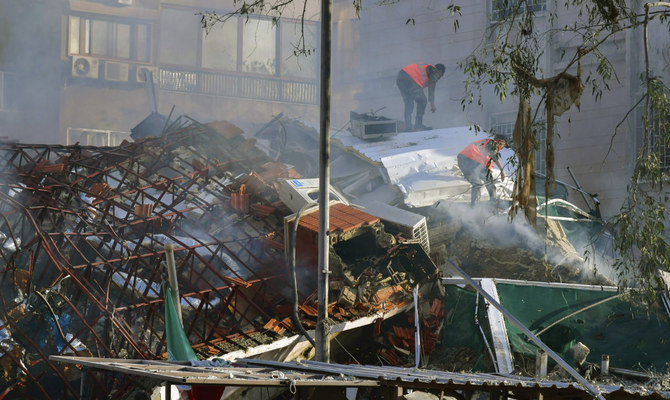
- Multiple arms of Iran’s government served notice that they would hold the United States accountable for the fiery attack
UK announces compensation package for blood scandal victims
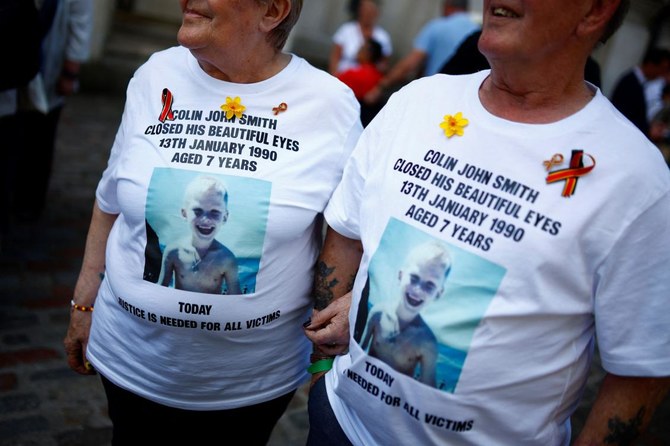
- Damning report blames successive governments, officials and doctors for failures that resulted in more than 3,000 deaths
“The government will be making further interim payments ahead of the establishment of the full scheme,” minister John Glen told parliament, a day after a damning report blamed successive governments, officials and doctors for failures that resulted in more than 3,000 deaths.
“Payments of 210,000 pounds will be made to living infected beneficiaries,” he added.
Prime Minister Rishi Sunak made a “wholehearted unequivocal apology for this terrible injustice” on Monday, adding that those affected would receive “comprehensive compensation.”
More than 14,000 displaced from Ukraine’s Kharkiv region: WHO

- WHO official in Ukraine: Conflict in Kharkiv ‘has significantly increased the number of trauma patients’
- UNHCR voices concerns that conditions in Kharkiv could become even more difficult if the ground assault and aerial attacks continue
GENEVA: More than 14,000 people have been displaced in recent days from Ukraine’s eastern Kharkiv region, where Russia launched a ground offensive on May 10, the World Health Organization said Tuesday.
The assault has seen Russian forces achieve their largest territorial gains in Ukraine in the last 18 months.
“Over the past two weeks, fighting in the Kharkiv region of Ukraine has severely escalated,” Jarno Habicht, the WHO’s representative in Ukraine, told a press briefing in Geneva, via video-link from Kyiv.
“Over 14,000 people have been displaced in a matter of days, and nearly 189,000 more still reside within 25 kilometers of the border with the Russian Federation, facing significant risks due to the ongoing fighting,” he said.
He said the UN health agency was using these figures after speaking with local authorities.
“With the worsening security situation, humanitarian needs in the region are growing, and growing fast,” Habicht said.
The conflict in Kharkiv “has significantly increased the number of trauma patients,” he added.
Russia launched its full-scale invasion of Ukraine in February 2022.
Since then, more than 20,000 amputations have been carried out, said Habicht.
And 200 ambulances per year, on average, have been damaged or destroyed in shelling attacks, “depriving the Ukrainian people of urgent care,” he added.
The UNHCR voiced concerns that conditions in Kharkiv — already home to 200,000 internally displaced people — could become even more difficult if the ground assault and aerial attacks continue.
“UNHCR, the UN refugee agency, is extremely worried about the worsening situation and resulting spike in humanitarian needs and forced displacement owing to the new ground offensive,” spokeswoman Shabia Mantoo told the Geneva briefing.
She said the Ukrainian authorities had evacuated more than 10,300 people from villages in the Kharkiv region’s border areas, while others have left by their own means.
“The majority of the evacuees, who had to escape their homes with only a few belongings, are already highly vulnerable and include mainly older people and those with low mobility or disabilities who were not able to flee earlier,” Mantoo said.
Those registered at a transit center in Kharkiv city have been given basic relief items and advised on accommodation options.
“The vast majority of evacuees have expressed a clear wish to stay with family members or in rental accommodation and collective sites in Kharkiv and not move further from their homes, to be able to return when the situation allows,” Mantoo said.
The United Nations’ 2024 humanitarian plan for Ukraine amounts to $3.1 billion this year. UN spokeswoman Alessandra Vellucci said that it was thus far only 23 percent funded.
1 dead, others injured after London-Singapore flight hit severe turbulence, Singapore Airlines says

- The airline said the aircraft was a Boeing 777-300ER with a total of 211 passengers and 18 crew on board
BANGKOK: Singapore Airlines says a person has died aboard and others were injured when a London-Singapore flight encountered severe turbulence.
Singapore’s Flight SQ321 from Heathrow was diverted to Bangkok and landed at 3:45 p.m. local time at Suvarnabhumi Airport, the airline announced in its Facebook page. The airline said the aircraft was a Boeing 777-300ER with a total of 211 passengers and 18 crew on board.
Local emergency crews from Samitivej Srinakarin Hospital were on site to transfer injured people off the runway for treatment. Videos posted on the LINE messaging platform by Suvarnabhumi Airport showed a line of ambulances streaming to the scene.
Britain’s new protest laws unlawful, London court rules in rights group’s challenge

- Civil rights group Liberty took the government to court over changes to public order laws made last year
- Judge rules new regulations gave the police almost unlimited powers to shut down protests
LONDON: Britain unlawfully gave police wider powers to impose conditions on peaceful protests which cause “more than minor” disruption to the public, London’s High Court ruled on Tuesday.
Civil rights group Liberty took the government to court over changes to public order laws made last year, which it says gave the police almost unlimited powers to shut down protests.
The case was heard in February amid a wider crackdown on protest movements in Britain and across Europe, as environmental activists have used direct action protests to demand urgent government action against climate change.
Judges David Bean and Timothy Kerr ruled in the group’s favor on Tuesday, finding that the regulations granting the new powers were unlawful.
The High Court granted the government permission to appeal and suspended its decision that the new powers should be quashed pending the outcome of the appeal.
Liberty’s legal action focused on the Public Order Act, under which the police can impose conditions on a protest if it could cause “serious disruption to the life of the community.”
The law was amended last year, so police could impose conditions in cases where a protest could cause “more than minor” disruption, which Liberty said was unlawful.
Government lawyers argued that ministers were given express powers to amend the law on what amounted to serious disruption.
But the High Court ruled that the government exceeded its powers, which “did not extend to lowering the threshold for police intervention.”
Thai minister quits over legal complaint seeking PM’s dismissal

- Pichit Chuenban says his resignation would allow the country ‘to move ahead and not impact the administrative work of the prime minister that needs continuity’
BANGKOK: A Thai minister at the center of a pending legal complaint seeking the dismissal of Prime Minister Srettha Thavisin resigned on Tuesday, in an effort to insulate the premier from possible repercussions.
A group of 40 senators lodged a complaint to the Constitutional Court last week against Pichit Chuenban, 65, saying his appointment last month as minister to the prime minister’s office breached the constitution, as he has a criminal record.
The court was due on Thursday to decide whether or not to accept the case, which could lead to Srettha’s suspension.
“Even though I have been vetted and honestly believe that I am qualified by law, this matter is linked to the prime minister,” Pichit said in his resignation letter, shared with media by Srettha’s office.
He said his resignation would allow the country “to move ahead and not impact the administrative work of the prime minister that needs continuity.”
It was not immediately clear whether the resignation would have any impact on the complaint submitted to the court.
Pichit was jailed for six months in 2008 for contempt of court after an alleged attempt to bribe court officials with 2 million baht ($55,000) hidden in a paper grocery bag.
His law license was suspended for five years by the Lawyers Council of Thailand after the incident. The government has said it carefully vetted Pichit’s qualifications and was confident it could defend his appointment before the court.
Pichit becomes the third minister to quit Srettha’s cabinet, after his foreign minister and deputy finance minister resigned following a cabinet reshuffle last month.
The senators, whose term has ended, are currently lawmakers in a caretaker capacity pending the selection of a new chamber. They have accused Pichit of lacking integrity and ethical standards to hold a ministerial post.
Government critics say Pichit was appointed due to his close relationship with a client, ex-premier Thaksin Shinawatra, who returned to Thailand last year after 15 years in exile. Thaksin, an ally of Srettha, still wields considerable political influence, despite officially being retired.
The government has insisted Pichit was appointed due to his capabilities.



